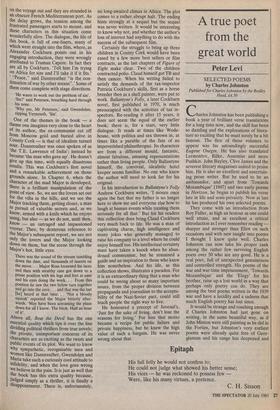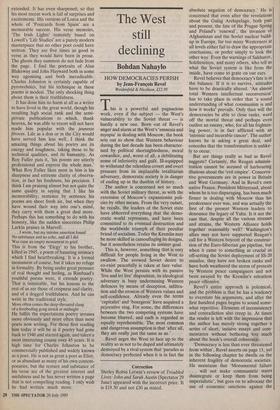A true poet from the great world
Peter Levi
SELECTED POEMS by Charles Johnston
Published for Charles Johnston by the Bodley Head, f4.50
Charles Johnston has been publishing a book a year of brilliant verse translations for a long time now, and the skill has been so dazzling and the explorations of litera- ture so exciting that he must surely be a bit famous. The first of these volumes to appear was his astoundingly successful Eugene Onegin. He has also translated Lermontov, Rae, Ausonius and more Pushkin. John Bayley, Clive James and the severest literary magazines united to praise him. He is also an excellent and entertain- ing prose writer. But he used to be an ambassador, and apart from 'Towards Mozambique' (1947) and two early poems in Horizon, he began to publish his verse late in life and semi-privately. Now at last he has produced his own selected poems.
They come with an introduction from Roy Fuller, as high an honour as one could well attain, and as excellent a critical introduction as I ever remember reading sharper and stronger than Eliot on such occasions and with new insight into poems I thought I knew quite well. Charles Johnston can now take his proper rank among the rather few surviving English poets over 50 who are any good. He is a real poet, full of unexpected genuineness and controlled strength. His poems of the war and war-time imprisonment, 'Towards Mozambique' and the 'Elegy' for his brother, raise up a lost world in a way that perhaps only poetry can do. They are among the best poems written in the 1939 war and have a lucidity and a sadness that much English poetry has lost since.
It would be strange and touching enough if Charles Johnston had just gone on writing, in the same beautiful way, as if John Minton were still painting as he did in the Forties, but Johnston's very earliest poems were already quite free of Geor- gianism and his range has deepened and extended. It has even sharpened, so that his most recent work is full of surprises and excitements. His versions of Lorca and the whole of 'Postcards from Spain' are a memorable success. His verse memoirs, `The Irish Lights' remotely based on Lowell's 'Life Studies' are a purely modern masterpiece that no other poet could have written. They are five times as good in verse as they would have been in prose. The ghosts they summon do not fade from the page. I find the portraits of Alan Blakeway and John Hayward both in some way agonising and both ineradicable. Charles Johnston is certainly capable of pyrotechnics, but his technique in these poems is modest. The only shocking thing about them is their truthfulness.
It has done him no harm at all as a writer to have lived in the great world, though his resulting high social rank and the semi- private publications to which, thank heaven, he was able to resort will not have made him popular with the jeunesse feroces. Life as a don or in the City would have served him less well. I think the amazing things about his poetry are its energy and toughness, taking these to be technical qualities, and its humanity. As Roy Fuller puts it, 'his poems are utterly professional and express the whole man.' What Roy Fuller likes most in him is his sharpness and extreme clarity of observa- tion, in fact his freshness, his precision. I think I am praising almost but not quite the same quality in saying that I like his memorability; sentence by sentence his poems are sheer fresh air, but when they have wound their way into one's mind, they carry with them a great deal more. Perhaps this has something to do with his honesty, like the sudden sincerities Philip Larkin praises in Marvell: . . . I wrote, but my intense assertion found
No substance and no echo, and all I did
Was raise an empty monument to grief.
This is from the 'Elegy' to his brother, killed in 1945, a poem of haunting intimacy which I find heartbreaking. It is a formal monument of course, but it takes no refuge in formality. By being under great pressure of real thought and feeling, as Rimbaud's youthful poems were, it extends poetry. That is inimitable, but his lessons to the rest of us are those of crispness and clarity, and of a dogged truthfulness. And he can write in the traditional style.
More often comes the deep-throated clang of a foreboding gong struck at midnight . . .
He fulfils the expectations poetry arouses more obviously and more often than most poets now writing. For those first reading him today it will be as if poetry had gone back to 1940 and started again, and taken a most interesting course over 45 years. It is high time for Charles Johnston to be commercially published and widely known as a poet. He is not as great a poet as Eliot, or as abundant as many of his own contem- poraries, but the texture and substance of his verse are of the greatest interest and usefulness and he has never written a page that is not compelling reading. I only wish he had written much more.



















































 Previous page
Previous page